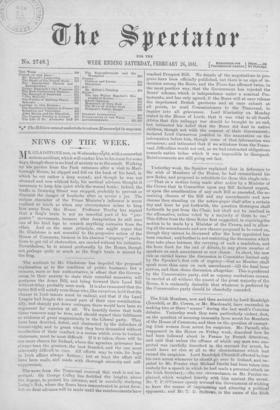Yesterday week, the Speaker explained that in deference to the
wish of Members of the House, he had reconsidered his new Rules, and proposed to substitute for them this single rule: —" That on a motion being made after notice by a Minister of the Crown that in Committee upon any Bill declared urgent, or upon the consideration of any such Bill as amended, the re- maining clauses of the Bill and any amendments and new clauses then standing on the notice-paper shall after a certain day and hour be put forthwith, the question thereupon shall forthwith be put from the Chair, but shall not be resolved in the affirmative, unless voted by a majority of three to one." This differs from the three Rules first suggested, in requiring the motion to be made by a Minister of the Crown, and in allow- ing all the amendments and new clauses proposed to be voted on, though they cannot be discussed after the hour appointed has been reached ; and further in not restricting the discussion which does take place between the carrying of such a resolution, and the hour fixed for the end of debate, to any given number of speakers on each amendment or new clause. In short, the new rule as carried leaves the discussion in Committee limited only by the Speaker's first rule of urgency—that no Member shall speak more than once on each amendment—till the final hour arrives, and then closes discussion altogether. This is preferred by the Conservative party, and as urgency resolutions cannot be carried at all without the assent of the great majority of the House, it is eminently desirable that whatever is preferred by the Conservative party should be cheerfully conceded.


































